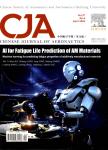Rigorous and integrated self-calibration model for a large-field-of-view camera using a star image
作者机构:Institute of Geospatial InformationInformation Engineering UniversityZhengzhou 450001China
出 版 物:《Chinese Journal of Aeronautics》 (中国航空学报(英文版))
年 卷 期:2023年第36卷第12期
页 面:375-389页
核心收录:
学科分类:07[理学] 070401[理学-天体物理] 0704[理学-天文学]
基 金:co-supported by the National Natural Science Foundation of China(Nos.42074013 and 41704006)
主 题:Camera calibration Calibration model Imaging models Lens distortion Star image
摘 要:This paper proposes a novel self-calibration method for a large-FoV(Field-of-View)camera using a real star ***,based on the classic equisolid-angle projection model and polynomial distortion model,the inclination of the optical axis is thoroughly considered with respect to the image plane,and a rigorous imaging model including 8 unknown intrinsic parameters is ***,the basic calibration equation based on star vector observations is ***,the partial derivative expressions of all 11 camera parameters for linearizing the calibration equation are deduced in detail,and an iterative solution using the least squares method is ***,simulation experiment is designed,results of which shows the new model has a better performance than the old *** last,three experiments were conducted at night in central China and 671 valid star images were *** results indicate that the new method obtains a mean magnitude of reprojection error of 0.251 pixels at a 120°FoV,which improves the calibration accuracy by 38.6%compared with the old calibration model(not considering the inclination of the optical axis).When the FoV drops below 20°,the mean magnitude of the reprojection error decreases to 0.15 pixels for both the new model and the old *** stars instead of manual control points are used,the new method can realize self-calibration,which might be significant for the long-duration navigation of vehicles in some unfamiliar or extreme environments,such as those of Mars or Earth’s moon.



